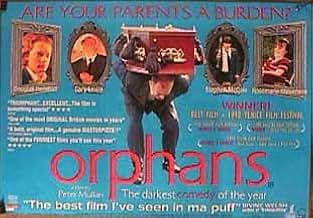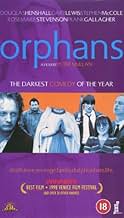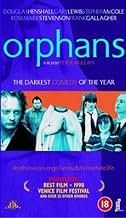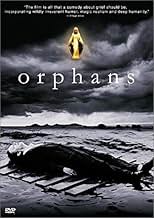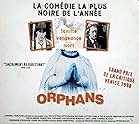Orphans
- 1998
- 1h 41min
CALIFICACIÓN DE IMDb
7.0/10
1.9 k
TU CALIFICACIÓN
Cuatro hermanos reunidos para el funeral de su madre en Glasgow se enfrentan durante la noche a tormentos individuales durante una tumultuosa tormenta que arranca el tejado de la iglesia.Cuatro hermanos reunidos para el funeral de su madre en Glasgow se enfrentan durante la noche a tormentos individuales durante una tumultuosa tormenta que arranca el tejado de la iglesia.Cuatro hermanos reunidos para el funeral de su madre en Glasgow se enfrentan durante la noche a tormentos individuales durante una tumultuosa tormenta que arranca el tejado de la iglesia.
- Premios
- 10 premios ganados y 2 nominaciones en total
Linda Jane Devlin
- Evelyn (Waitress in Bar)
- (as Linda Cuthbert)
- Dirección
- Guionista
- Todo el elenco y el equipo
- Producción, taquilla y más en IMDbPro
Opiniones destacadas
7imxo
Wow, what a night this has been. It started off with Glasgow's very interesting "Orphans", and finished with Berlin's equally interesting "Nighshades"; the first was a black comedy, the second merely black. My advice to the neighbors of these Glaswegians and Berliners would be: keep your doors locked.
Both of these films deal with the eternal verities of life - love, loyalty, friendship, duty, betrayal, etc. - as encountered amid the emotional squalor in two of northern Europe's major cities, but there are enough sociopathic and psychopathic characters in these two films to populate several good sized asylums for the criminally insane. These people need to get more sun.
"Orphans", at least, was a bittersweet black comedy, though more bitter than sweet. Life might be hard in inner-city Glasgow, but some of their vendettas would seem more appropriate to Sicily than to Scotland. There is a harshness to the humor that is at times more than black. Death can often be funny, but can one say the same for rape and murder - even when not fully consumated? Perhaps the English can enjoy this bit of schadenfreude at the Scots' expense.
I have only one real complaint about "Orphans", however, and it's a technical one. The film has the WORST SUBTITLES EVER PUT ON FILM - and they're English-to-English! If the characters are speaking English - heavily accented though it may be - why on earth would the dialog itself be changed in the sub-titles? Do the people responsible really believe that they have to substitute the word "baby" in the sub-titles every time a Glaswegian holding a child makes a reference to the "wee 'un?" And to hear the characters actually say the "F" word dozens of times, yet find the word in the sub-titles not once is very odd. Maybe these sub-titles are a part black-comedy in themselves. Ultimately, though, they are just disappointing and unprofessional. In the event, I would certainly recommend this film for it's superb acting - at least I hope it's acting - black humor, and unique take on Death in Glasgow, but when it comes to your summer holidays I'd recommend giving working-class Glasgow a very wide berth. Ditto for Berlin.
Both of these films deal with the eternal verities of life - love, loyalty, friendship, duty, betrayal, etc. - as encountered amid the emotional squalor in two of northern Europe's major cities, but there are enough sociopathic and psychopathic characters in these two films to populate several good sized asylums for the criminally insane. These people need to get more sun.
"Orphans", at least, was a bittersweet black comedy, though more bitter than sweet. Life might be hard in inner-city Glasgow, but some of their vendettas would seem more appropriate to Sicily than to Scotland. There is a harshness to the humor that is at times more than black. Death can often be funny, but can one say the same for rape and murder - even when not fully consumated? Perhaps the English can enjoy this bit of schadenfreude at the Scots' expense.
I have only one real complaint about "Orphans", however, and it's a technical one. The film has the WORST SUBTITLES EVER PUT ON FILM - and they're English-to-English! If the characters are speaking English - heavily accented though it may be - why on earth would the dialog itself be changed in the sub-titles? Do the people responsible really believe that they have to substitute the word "baby" in the sub-titles every time a Glaswegian holding a child makes a reference to the "wee 'un?" And to hear the characters actually say the "F" word dozens of times, yet find the word in the sub-titles not once is very odd. Maybe these sub-titles are a part black-comedy in themselves. Ultimately, though, they are just disappointing and unprofessional. In the event, I would certainly recommend this film for it's superb acting - at least I hope it's acting - black humor, and unique take on Death in Glasgow, but when it comes to your summer holidays I'd recommend giving working-class Glasgow a very wide berth. Ditto for Berlin.
Unfortunately, i didn't watch the movie "Trainspotting", so i missed Mullan's acting in that film. I knew that "Orphans" is the first directorial debut of Mullan.
The entire film has been brilliantly directed.The story of the movie in short: four brother and sister gather at a stormy night for their mother's funeral.As they gather, their love, hate, grief, for each other are expressed individually in that brilliant drama.
The entire cast and music are nice. actually, i like Stevenson's acting as "Sheila". She is brilliant.
Congratulation Mullan to direct such a brilliant drama!
I would like to rate this movie : 8 out of 10.
The entire film has been brilliantly directed.The story of the movie in short: four brother and sister gather at a stormy night for their mother's funeral.As they gather, their love, hate, grief, for each other are expressed individually in that brilliant drama.
The entire cast and music are nice. actually, i like Stevenson's acting as "Sheila". She is brilliant.
Congratulation Mullan to direct such a brilliant drama!
I would like to rate this movie : 8 out of 10.
A magnificent film that deals with grief in a very black yet warm manner.
Three brothers and a sister are torn apart upon the death of their mother. In the lead up to her funeral they all express their loss in different ways, from the recklessly violent to the automated responses of dealing with the ritual of the funeral itself.
Peppered with wonderful moments of Glaswegian humour - the graveside scene, though obviously contrived, is a moment of pure comic genius - this film is both deeply touching and funny.
If you like your humour dark, see it now.
Three brothers and a sister are torn apart upon the death of their mother. In the lead up to her funeral they all express their loss in different ways, from the recklessly violent to the automated responses of dealing with the ritual of the funeral itself.
Peppered with wonderful moments of Glaswegian humour - the graveside scene, though obviously contrived, is a moment of pure comic genius - this film is both deeply touching and funny.
If you like your humour dark, see it now.
Traditions in life and death are important but, in this film they are carried to extreme.It's Glasgow,it's late and anything can happen and does.Peter Mullen provides an ironic view of reactions to grief as epitomized by the family.Each pursues a tragic/comedic personal journey through the night prior to their mother's funeral. A great asset to the Tourist industry highlighting Glasgow's night life. A great cast who feed of each other magnificently. Very funny film.
With his third film as director Neds seeing release just recently, the previous two films of Peter Mullan were given a back-to-back television showing. I managed to catch his first, Orphans, having never before heard anything of it.
Meeting to mourn the loss of their mother, four Glaswegian siblings gather in a pub. When an inconsiderate group laugh at the lugubrious singing of the eldest, one of his brothers retorts physically and is stabbed. The remaining brother vows to avenge this whilst the handicapped sister finds herself stuck in a darkened alley, her wheelchair broken.
Orphans begins with a solemn scene, the four siblings gathered around their mother's coffin. Some gentle humour is created through the siblings' confusion at their elder's request that they place some hair in the coffin. This introduces us to the film's primary structure: scenes of genuine heartfelt drama lined with a subtle comedy to balance the mood. As things progress, we begin to see in increase in this comic factor, the film's clever blending of its contrasting elements creating a wonderful dichotomy. The true beauty of the film, however, is in its juxtaposition of its constituent elements. Many are the scenes which Mullan allows to play out, drawing us in with a barrage of riotous laughter, before effortlessly turning this on its head with a disarming simplicity and forcing us to comprehend the dramatic implications of the events unfolding before us. In a simple moment, we go from laughing at something to considering its grim seriousness. It is a stunning effect, one often attempted but rarely realised so fantastically as here. Mullan ends his scenes by inviting us to reconsider what we have just seen; we find ourselves looking at events with a melancholy when just moments ago they had us reduced to breathless laughter. He allows us to indulge ourselves in the fantastic comedy his writing engenders before showing us that these scenarios are in fact tremendously dark and dramatic. We may chuckle at Michael's determination to pass off his stab wound as an industrial accident, but we quickly reevaluate the true humour of this when we realise that he is slowly dying, his lightening pallor eventually quite frightening. This is just one example of the many such twists Mullan throws at us, showing himself to be as dramatically dark as he is ingeniously funny.
A truly fantastic combination of drama and comedy, done in a subversive way which forces us to reevaluate what we thought of a scene just seconds before, Orphans is a fantastic exploration of the closeness of drama and comedy. Splendidly supported by fantastic, hilarious, and realistically authentic Glaswegian performances, this film has certainly proclaimed Peter Mullan as a masterful director.
Meeting to mourn the loss of their mother, four Glaswegian siblings gather in a pub. When an inconsiderate group laugh at the lugubrious singing of the eldest, one of his brothers retorts physically and is stabbed. The remaining brother vows to avenge this whilst the handicapped sister finds herself stuck in a darkened alley, her wheelchair broken.
Orphans begins with a solemn scene, the four siblings gathered around their mother's coffin. Some gentle humour is created through the siblings' confusion at their elder's request that they place some hair in the coffin. This introduces us to the film's primary structure: scenes of genuine heartfelt drama lined with a subtle comedy to balance the mood. As things progress, we begin to see in increase in this comic factor, the film's clever blending of its contrasting elements creating a wonderful dichotomy. The true beauty of the film, however, is in its juxtaposition of its constituent elements. Many are the scenes which Mullan allows to play out, drawing us in with a barrage of riotous laughter, before effortlessly turning this on its head with a disarming simplicity and forcing us to comprehend the dramatic implications of the events unfolding before us. In a simple moment, we go from laughing at something to considering its grim seriousness. It is a stunning effect, one often attempted but rarely realised so fantastically as here. Mullan ends his scenes by inviting us to reconsider what we have just seen; we find ourselves looking at events with a melancholy when just moments ago they had us reduced to breathless laughter. He allows us to indulge ourselves in the fantastic comedy his writing engenders before showing us that these scenarios are in fact tremendously dark and dramatic. We may chuckle at Michael's determination to pass off his stab wound as an industrial accident, but we quickly reevaluate the true humour of this when we realise that he is slowly dying, his lightening pallor eventually quite frightening. This is just one example of the many such twists Mullan throws at us, showing himself to be as dramatically dark as he is ingeniously funny.
A truly fantastic combination of drama and comedy, done in a subversive way which forces us to reevaluate what we thought of a scene just seconds before, Orphans is a fantastic exploration of the closeness of drama and comedy. Splendidly supported by fantastic, hilarious, and realistically authentic Glaswegian performances, this film has certainly proclaimed Peter Mullan as a masterful director.
¿Sabías que…?
- TriviaPeter Mullan was horrified to learn that the film's production company, FilmFour, had accidentally burned over 30 minutes of footage. This was due to a clerical error.
Selecciones populares
Inicia sesión para calificar y agrega a la lista de videos para obtener recomendaciones personalizadas
- How long is Orphans?Con tecnología de Alexa
Detalles
- Fecha de lanzamiento
- País de origen
- Idioma
- También se conoce como
- Ett sista farväl
- Locaciones de filmación
- Productoras
- Ver más créditos de la compañía en IMDbPro
Taquilla
- Total en EE. UU. y Canadá
- USD 54,754
- Fin de semana de estreno en EE. UU. y Canadá
- USD 16,098
- 12 mar 2000
- Total a nivel mundial
- USD 54,754
- Tiempo de ejecución1 hora 41 minutos
- Color
- Mezcla de sonido
- Relación de aspecto
- 1.85 : 1
Contribuir a esta página
Sugiere una edición o agrega el contenido que falta

Principales brechas de datos
By what name was Orphans (1998) officially released in India in English?
Responda

